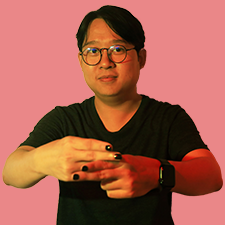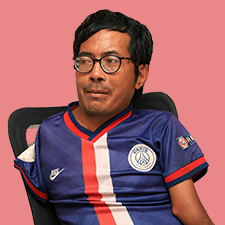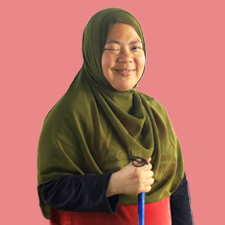Corporations fail to properly recruit disabled persons into their workforce. The government’s target remains vastly unfulfilled. For the International Day of Persons with Disabilities, Tempo talks to three disabled professionals who despite all odds have made it work.
BASED on a survey from the Central Statistics Agency (BPS) in 2020, Indonesia has a record of 22.5 million, or 5 percent of its 255 million populations, are people with disabilities. They have trouble accessing a variety of facilities in the country, from basic transportation to homes that accommodate their disabilities.
However, one of their main struggles is being accepted into a formal workspace. Based on the BPS’ National Labor Force Survey in February, there are 7.8 million people with disabilities in the workforce. But, according to the ministry of manpower’s mandatory reporting site (WLKP) in October, there are only 3,433 disabled people who are working in a corporate setting.
It is still far from the government’s target for people with disabilities. The manpower ministry has set a target of 3,304 companies in Indonesia to employ disabled workers. However, the real number for 2022 only accounts for 969 private companies employing persons with disabilities.
This figure also goes against the government’s protections for people with disabilities, as stated in Law No. 8/2016 concerning persons with disabilities, where there is a requirement that all companies should have at least one percent of their workforce be disabled people.
Tempo talks to three professionals who have managed to earn a living in different parts of the country to share about their life and the reality of the workspace in Indonesia. Cristophorus Budidharma is a man with hearing impairments who works as an event manager for Inklusiv Warung, a restaurant in Bali. Vicente Mariano is a physically disabled person who is currently the spokesperson for the Indonesian Amputee Soccer Association (PSAI), as well as a chess athlete. We also talk to Cheta Nilawaty, a blind reporter at Tempo who is currently studying in Australia. Cheta became blind in 2016 due to retinal detachment caused by diabetic retinopathy.
The following interviews are shortened and combined for clarity. Read the full series of articles, here.
How was your experience in looking for a job?

Cristophorus Budidharma (CR):
I have applied to over 300 companies for HRD (human resources department) manager to culture manager, and many more after graduating from university. Unfortunately, I did not get any good news from them. I didn’t tell them about my deafness because I believe it is not important to know at the first time and also to avoid first-phase eliminations and to advance to the next step. Only during the interview would I tell them I am deaf and bring my own sign language interpreter.
It’s always challenging to find a job, but I believe it is not about my deafness but about common sense. Many people find that getting a job is not easy as well. If the company rejects someone because of their deafness, then it would be a different story. I think having an impressive resume, experiences, professionalism and confidence is ultimately the key to getting a career.

Vincente Mariano (V):
I got my first job after I left for Jakarta from Yogyakarta in 2015, when I was 31 or 32. At first, I was reckless going to Jakarta, because I felt that if I stayed in my hometown, I could never move forward.
I have always been in the field of communications, but I was not good at interacting with people with disabilities. I was completely blind to the disabled community until I was invited to join a (disabled persons) community by my uncle. Through that, I was introduced to the Cheshire Indonesia Foundation (Wisma Cheshire), a training center for people with physical disabilities. I took the interview process and was accepted to work there.
There are tips (to find a job). First, definitely skill. Second, mindset. You have to know how to behave, especially in an unfavorable situation. For example, being accepted for a job in a place that has little access for persons with disabilities.


Cheta Nelawati (CH):
I already had a job from the start (before her blindness), so I never had to take part in a job search (as a blind person). But I took part in a scholarship selection for my study. So maybe I can just contribute a little.
The point is never give up. I had to prepare myself to be even stronger because I had to compete with a non-disabled person who has full capabilities. Prepare yourself to work twice as hard as non-disabled people. If they study two hours a day at night, if necessary, we have to study from sundown until midnight. If we are not persistent and don’t compete harder, then we will lose.

CHETA NILAWATY
Prepare yourself to work twice as hard as non-disabled people. If they study two hours a day at night, if necessary, we have to study from sundown until midnight.
Have you ever experienced any discrimination?

Cristophorus Budidharma (CR):
Well, it depends on the perspective. Technically speaking, I experienced indirect discriminations, such as when I was in a discussion, and some hearing people talked to each other and forgot that deaf people were present. However, I understand that they were not aware and it was not their bad intention but rather a habit. Fortunately, I am calm, and it is tolerable.

Vincente Mariano (V):
Back when I was in my hometown, I liked to join local organizations. Once during an Indonesian Catholic Youth activity, I was sent to West Kalimantan to campaign for persons with disabilities to the public. There, the stigmatization (to disabled people) is much stronger than in cities due to knowledge issues.
In the regions, people hold their culture closely. There’s a view that having a relative with a disability means the family has problems. It’s a pity, very often friends with disabilities in the regions are hidden away. They would say “surely your parents violated traditions.” That’s how it is.

Cheta Nelawati (CH):
I had to cover Asian Para Games several years ago. I came to the event organizer desk, then they said, “Miss, are you really a journalist? This is the media desk, you know. The desk of Melati Rehabilitation Development Institution (PSBR) supporters is over there.” In my entire career, I never had to show my Tempo press card until then.
Also when I took Gojek (online motorcycle taxi), they asked where I would give a massage service. Even though I told them, I was a journalist. When one of them dropped me off at the lobby (of Tempo), he thought I was going to massage someone. So he didn’t believe I was a journalist.
Even when I study in Australia, some would ask “A blind journalist?”, “Isn’t it impossible for you to study in Australia?” The point is they don’t believe me. It’s like my blindness is an anomaly. People don’t believe I’m a journalist, and they also don’t believe I’m studying in Australia.

VINCENTE MARIANO
It’s a pity, very often friends with disabilities in the regions are hidden away. They would say “surely your parents violated traditions.”
How do you handle accessibility problems at work?

Cristophorus Budidharma (CR):
Well, it is unique and unusual. I can read lips in Indonesian language but it still depends on the person, such as their mouth shape and size, also their teeth. However, I have my own limit to reading lips, such as when I am very tired, I would ask them to write or type on the mobile phone. Definitely, I feel comfortable with sign language. I would be thrilled to communicate with staff who are fluent in sign language.

Vincente Mariano (V):
Many of the challenges I dealt with were external. There are offices that aren’t accessible and so on. For example, a wheelchair user might not have an accessible toilet, or even their office might also be inaccessible. In this case, they would have to be carried by someone else.

Cheta Nelawati (CH):
Tempo gave me funds to pay for a caregiver, which I looked for myself. Before, I had gone for a reporting by myself, which I shouldn’t have done, because there’s a possibility that I interviewed the wrong person. Finally, I had to be guided by a non-disabled person around for mobility reasons. Since then I told the office I needed to use a caregiver.
How is the policy of your office for workers with disabilities?

Cristophorus Budidharma:
For Silang.id and Inklusiv Warung, both have specific regulations that don’t tolerate discrimination, including discriminations on gender, age, sexual, and disability. Their policies are good as they ensure all staff members can do sign language and have deaf cultural competency. Additionally, they also ensure that they hire disabled and minority people as well, which is in accordance with our regulation that requires all companies to hire one percent of people with disabilities.


Vincente Mariano:
When I was at the Cheshire Indonesia Foundation, as a training foundation for disabled people, I had access to most things. Accessibility is valued from two things, physical and non-physical. The physical is from the building, while the non-physical is from the environment. What’s important is the non-physical. It is good if there are policy makers who really understand about disabilities and do everything with heart. If they only care for the disabled people because of the law, it will not be best because they only care about how it looks. No matter how good the program for the disabled people is, please involve them in the discussion. Those who know how to treat people with disabilities are they themselves.


Cheta Nelawati:
For me, the caregiver provided by the company is a decent accommodation. As a new person with a disability, I don’t really need ramps or anything. I prefer to be led by people who can see. I feel more secure (to be guided with people) than being provided with a guiding block. I still get lost when I use the guiding blocks. I think a good accessibility is provided based on the type of disabilities. For example, the physically disabled person has different needs from the blind person, which is also different from people with hearing impairments. So they can’t all be the same.



